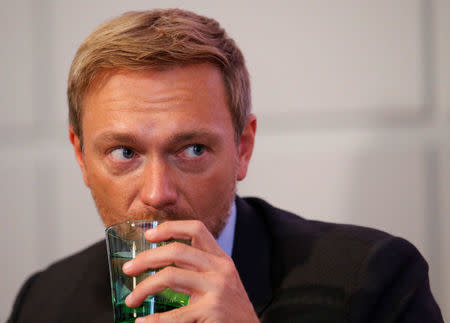FDP's push to invite Putin to G7 sows discord within possible German coalition
BERLIN (Reuters) - The leader of Germany's pro-business Free Democrats (FDP), a possible partner in Chancellor Angela Merkel's new government, has called for Russia to be invited to the next summit of the Group of Seven industrialised countries. The proposal met immediate resistance from Merkel's conservatives and the environmentalist Greens, throwing a possible wrench into already tricky negotiations about a three-way ruling coalition. FDP leader Christian Lindner told the Austrian newspaper Die Pressed that readmitting Russia to the Group of Eight could help ease tensions with Moscow. Russia was suspended from the group in 2014 after it annexed Ukraine's Crimea peninsula following an uprising in Kiev that toppled its pro-Moscow president. "We cannot make all things dependent on the situation in Crimea," Lindner said, although he said Russia's violation of international law could not be accepted. "But this is the most severe conflict and that's the last place we'll see progress," Lindner said. "That's why I'm in favour of intensifying dialogue - and that Putin is asked to join the table of the G7 and that one talks with him and not about him." Juergen Hardt, foreign policy spokesman for the conservatives, called Lindner's suggestion "unhelpful". "Putin would tout readmission to the exclusive G8 discussion format as confirmation of his policies at home, and that would be counterproductive," Hardt said. Omnid Nouripour, a Greens lawmaker and foreign policy expert, urged the FDP chief to refrain from any further suggestions until the potential coalition partners had worked out their Russia policy. The three blocs are due to start exploratory talks about a coalition next week, but experts have warned it could take months to bridge their differences on migration, climate and taxes. Finance Minister Wolfgang Schaeuble, a member of Merkel's conservatives, told an event in Washington that he expected the talks to be completed by Christmas. Fifty-seven percent of voters support the idea of the three-way coalition, according to a new poll for broadcaster ARD. Lindner had already raised eyebrows in August when he suggested that Germany might have to accept Russia's 2014 annexation of the Crimea region of Ukraine as a "permanent provisional arrangement". Merkel and Greens politicians have previously rejected calls to gradually lift sanctions against Russia imposed over its role in the Ukraine crisis. The centre-right chancellor has also objected to the idea of inviting Putin to G7 meetings. Turning to euro zone policies, Lindner repeated his criticism of French President Emmanuel Macron's proposals to create a joint euro zone budget. "A red line for us in any coalition talks is the mutualisation of debt in Europe, the creation of new pots of money," Lindner said. (Reporting by Michael Nienaber and Sabine Siebold; Editing by Alison Williams)



